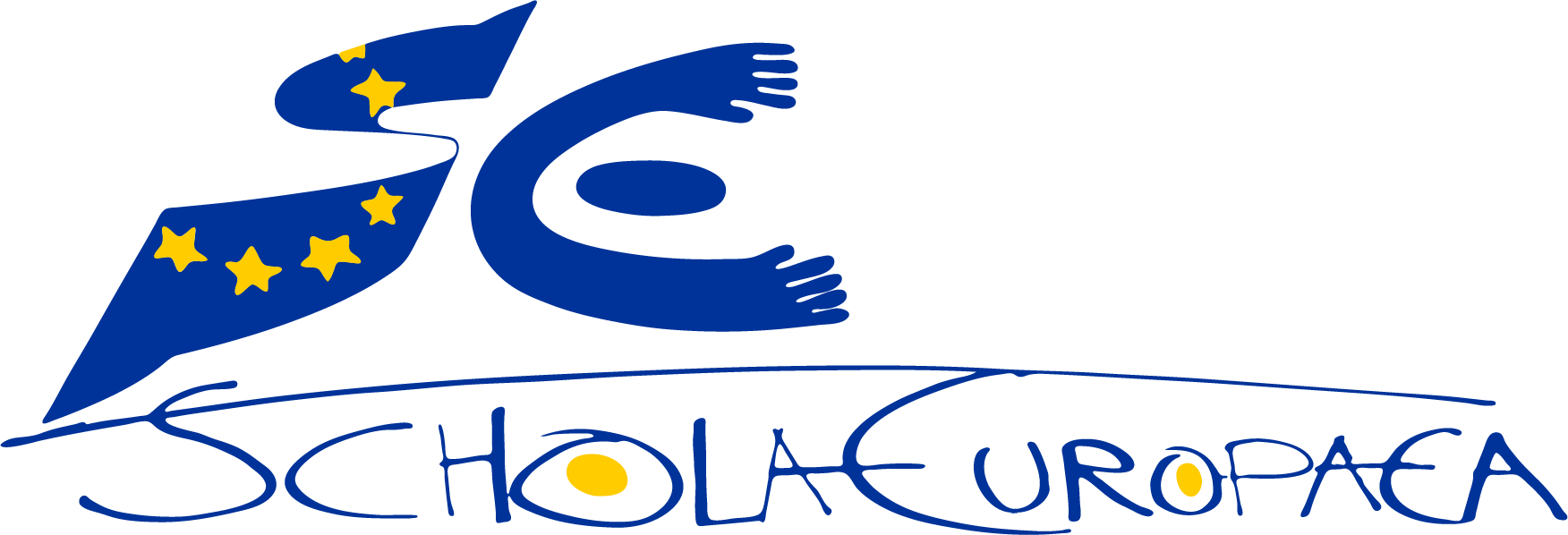Site blog
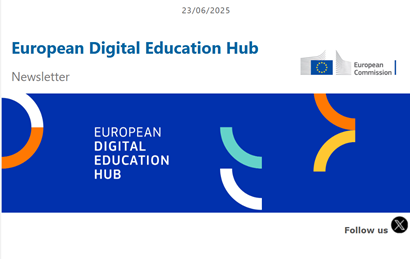
From their latest email:
"Our next webinar is called Data Literacy in a Digital Age and will take place on Wednesday 3 September, 15:00-16:00 CET. AI and constant data collection have transformed our view of data literacy. But are we keeping up? In this webinar, we will discuss how to build these key skills for students, teachers, parents, and pre-schoolers. Register for the webinar here. If you want to make your colleagues aware of the webinar, we invite you to share this LinkedIn post.
Then we will have the webinar 21st Century Skills – Bridging the Gap Between Education and Reality, in which we will discuss:
· Practical ways to add future-ready skills in classrooms.
· Effective methods for matching education with tech changes.
· Expert advice on building important skills for the digital age.
It will take place on Wednesday 24 September, 09:00-10:00 CET. Register here. Same thing there: if you want to spread the word, here is a LinkedIn post for that.
Finally, on the European Day of Languages, we will have another webinar, on the topic of digital language learning (sorry, no catchy title for this one). Digital language learning/teaching is interesting for several reasons: digital exchanges with native speakers is a hugely effective and cost-saving measure compared to travelling or meeting up with native speakers. On the other hand, it relies heavily on human communication, some aspects of which are difficult to transfer through a screen. In this webinar we will explore when digital tools, including AI tools, could and should be used to enhance language learning. The webinar will take place on Friday 26 of September, 12:00 – 13:00 CET. Register here."
You can also find their latest newletter here.
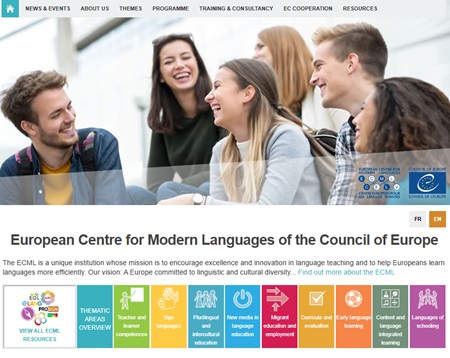
The ECML is an institution whose mission is to encourage excellence and innovation in language teaching and to help Europeans learn languages more efficiently.
Vision: A Europe committed to linguistic and cultural diversity, where the key role of quality language education in achieving intercultural dialogue, democratic citizenship and social cohesion is recognised and supported.
In the area of valuable resources for the ES network, we can mention the following:
- Resources for assessing the home language competences of migrant pupils
- CLIL in languages other than English - successful transitions across educational stages
- CEFR Companion Volume implementation toolbox
- Developing teacher competences for pluralistic approaches - training and reflection tools for teachers and teacher educators
- Digital citizenship through language education
- Enhancing language education in cross-border vocational education
- Young children's language learning pathways
- Mediation in teaching, learning and assessment
- Building blocks for planning language-sensitive teacher education
There are also new initiatives of the Center, each with valuable resources, such as:
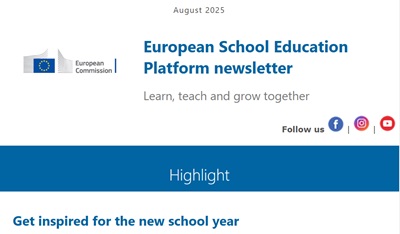
You can find the latest ESEP newsletter at:
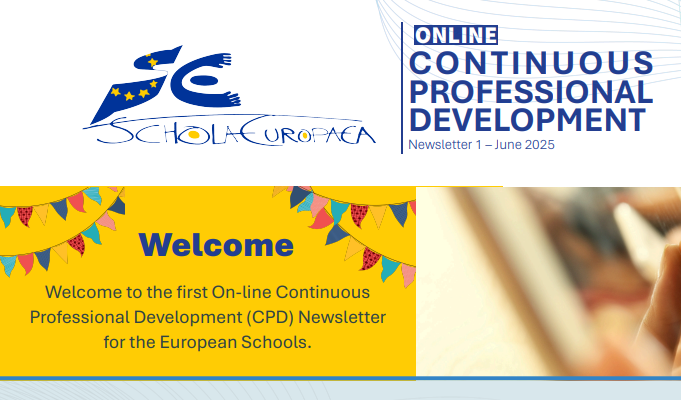
Read our first Online Continuous Professional Development Newsletter.
- CPD Responsibilities
- Building a CPD Catalogue
- Who are we?
- The OSGES media studio
- The Online CPD platform
- Share your expertise
- Coming soon
- Contact or visit us
If you are not a registered user, use "Guest access" to read the Newsletter.
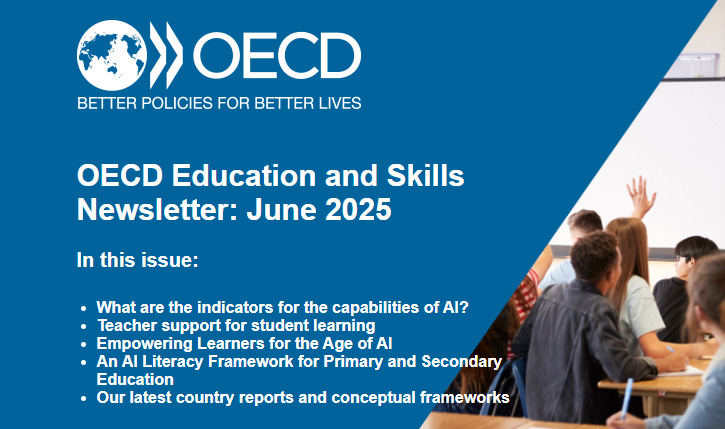
In this issue:
- What are the indicators for the capabilities of AI?
- Teacher support for student learning
- Empowering Learners for the Age of AI
- An AI Literacy Framework for Primary and Secondary Education
- Our latest country reports and conceptual frameworks
You can read the newsletter online.
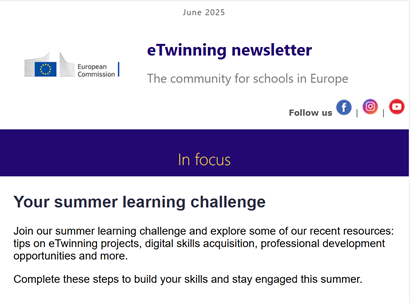
The eTwinning team suggests a summer learning summer in their latest newsletter.
You can find the online version of the newsletter here. [external link]

The European Digital Education Hub turns three this month, and they are marking the moment with new insights, community stories, and a series of exciting webinars.💡🌍
Find more information at their online Newsletter. [external link]
Remember that, to participate in any of the activities of the Hub, you need to "Become a member". [external link]
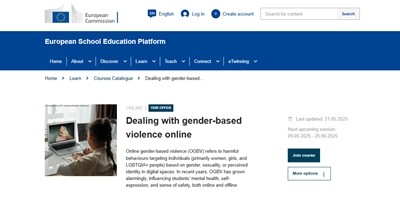
European School Education Platform Professional Development Opportunities
Upcoming courses:
-
Dealing with gender-based violence online
Online gender-based violence (OGBV) refers to harmful behaviours targeting individuals (primarily women, girls, and LGBTQIA+ people) based on gender, sexuality, or perceived identity in digital spaces. In recent years, OGBV has grown alarmingly, influencing students’ mental health, self-expression, and sense of safety, both online and offline.
📅 When? June 9, 2025
📍 Where? Online
This short course equips educators across Europe with the tools and knowledge to understand, prevent, and address OGBV among youth. Drawing from feminist pedagogy and an inclusive, sex-positive approach, the course focuses on training teachers to support students in navigating digital spaces with greater safety, empathy and awareness.
Through three dynamic modules, participants will explore the different forms of OGBV, including cyberbullying, image-based sexual abuse, deepfake pornography and cyber-harassment, and their impact on students. The course also examines the online manosphere and how platforms like TikTok and YouTube can sometimes reinforce harmful gender ideologies or exclusionary attitudes.
Rather than relying on fear-based or punitive strategies, the course encourages preventive education rooted in consent, emotional literacy and digital wellbeing. By the end of the course, teachers will be better equipped to identify signs of OGBV, support affected students and promote a culture of care, accountability and resilience in their learning environments.
Self-paced learning materials:
-
Using debate to build critical thinking and communication skills
Debate is one of the oldest forms of teaching and learning. Its European roots lie in the educational and intellectual traditions of ancient Greece and Rome, and debate has been practiced in many other cultures as well.
-
Students as designers of learning spaces
This course is back after a successful run in 2022. It invites teachers to rethink the role of learning spaces in fostering creativity, collaboration, and 21st-century skills.
-
Ethical and effective practices for AI and data in education
Every day, “intelligent” machines are sorting your inbox, recommending music, vacuuming your floor, or teaching you Klingon – and schools are not exempt from their influence.
-
Nurturing thoughtful minds through collaboration and eTwinning
In today’s ever-evolving educational landscape, fostering critical thinking is essential for preparing students to navigate complex challenges and make responsible decisions. This course focuses on how collaboration and group work can serve as powerful tools for developing critical.
-
Enhance numeracy skills with eTwinning projects
Upcoming webinars:
-
European Commission webinar on smartphones at school: Separating myths from evidence
This webinar offers a balanced, evidence-based look at the ongoing debate surrounding smartphone presence in schools. Drawing on recent research, we will examine both the potential benefits, and the challenges associated with smartphones in educational settings.
📅 When? June 12, 2025 - 4:00 PM
📍 Where? Online
![]() Guest expert? Marijn Martens is a postdoctoral researcher at the imec research group for Media, Innovation and Communication Technologies (imec-mict-UGent). He obtained a bachelor’s degree to teach Physics and Mathematics in secondary education (Artevelde University College, 2015), a master’s degree in Communication Sciences with a specialisation in New Media and Society (Ghent University, 2017), and a doctoral degree in Communication Sciences (Ghent University, 2023). He currently coordinates the research project “Disconnect-to-Connect”, a project focusing on the impact of smartphone (dis)connection on individuals and our society as a whole. Apart from smartphone (dis)connection, his expertise lies in the societal impact of algorithms and AI.
Guest expert? Marijn Martens is a postdoctoral researcher at the imec research group for Media, Innovation and Communication Technologies (imec-mict-UGent). He obtained a bachelor’s degree to teach Physics and Mathematics in secondary education (Artevelde University College, 2015), a master’s degree in Communication Sciences with a specialisation in New Media and Society (Ghent University, 2017), and a doctoral degree in Communication Sciences (Ghent University, 2023). He currently coordinates the research project “Disconnect-to-Connect”, a project focusing on the impact of smartphone (dis)connection on individuals and our society as a whole. Apart from smartphone (dis)connection, his expertise lies in the societal impact of algorithms and AI.
Key topics will include—among others— digital wellbeing, time displacement, distraction, and (a loss of) concentration. By separating common assumptions from empirical findings, we will explore practical ways to address concerns without overlooking the potential value smartphones can offer.
-
European Commission webinar on shaping digital habits through eTwinning projects: tools for smarter and safer learning
This webinar explores how digital tools can support students' digital literacy and safe online behaviour through eTwinning projects. Participants will discover practical strategies for using digital tools to foster collaboration and critical thinking, along with activities to promote responsible online habits.
📅 When? June 17, 2025 - 4:00 PM
📍 Where? Online
![]() Guest expert? Aneta Wilk brings over 20 years of experience in teaching English to both children and adults. Passionate about integrating new technologies into the educational process, she has designed and delivered numerous professional development courses for teachers, utilizing various distance learning platforms. In collaboration with her students, she has successfully implemented more than 20 eTwinning projects, many of which have received National and European Quality Labels. She was a moderator of the eTwinning featured group called “Bringing eSafety into eTwinning projects” for 10 years. She remains committed to continuous professional growth and development.
Guest expert? Aneta Wilk brings over 20 years of experience in teaching English to both children and adults. Passionate about integrating new technologies into the educational process, she has designed and delivered numerous professional development courses for teachers, utilizing various distance learning platforms. In collaboration with her students, she has successfully implemented more than 20 eTwinning projects, many of which have received National and European Quality Labels. She was a moderator of the eTwinning featured group called “Bringing eSafety into eTwinning projects” for 10 years. She remains committed to continuous professional growth and development.
The aim of the webinar is to explore how digital tools can be used to shape students' digital literacy and safe online habits through eTwinning projects.
Attendees will be introduced to practical strategies for utilising digital tools to facilitate collaboration and information exchange within the framework of eTwinning projects. Furthermore, the session will offer a range of exercises designed to foster critical thinking and enhance students’ ability to navigate the online environment safely and responsibly. A special focus will be also placed on the growing role of AI in education - how to use it effectively in the projects for generating didactic materials while also understanding its limitations.
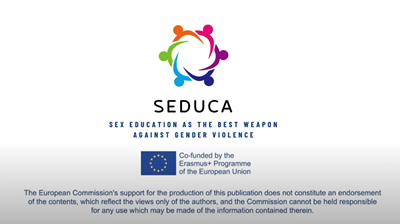
Sex Education as a Tool Against Gender Violence – SEDUCA Project
To support the inclusion of teaching material on issues such as gender equality, non-stereotyped gender roles, mutual respect, and non-violent conflict resolution, the SEDUCA project offers a timely and valuable educational resource for secondary students (ages 14–18).
Titled "Sex Education as the Best Weapon Against Gender Violence," the project provides both a comprehensive report and a documentary video. These materials are designed to be used in educational settings to foster reflection and discussion on key social topics such as gender-based violence, equality between women and men, and the right to personal integrity.
The SEDUCA project offers concrete tools to help educators introduce and address these issues in the classroom, aligning with broader European efforts to promote inclusion, dignity, and safety within formal and informal education.
🔗 You can access the full content of the SEDUCA project here: https://seducaproject.eu/report-and-documentary-video-of-our-investigation/
This initiative represents an important step in aligning educational practices with core European values of equality, dignity, and inclusion.
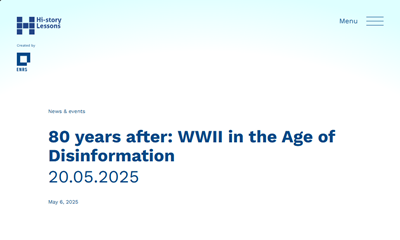
Is World War II a closed chapter of history—or still a battlefield today, in an era of manipulation and disinformation? Join our webinar to discover a new set of educational resources related to disinformation and memory conflicts.
The Histories at War: WWII in the Age of Disinformation educational package aims to provide teachers and educators with tools to mark the 80. anniversary of the WW2 ending. Join us to listen, ask your questions and receive a complete set of teaching materials. The goal of the package is to deepen historical knowledge, raise awareness of WWII’s consequences, and understand memory conflicts and disinformation. It also promotes critical thinking, media analysis, and recognizing modern threats like deepfake and AI-driven propaganda.
This May marks 80 years since the end of World War II – not only a moment of reflection, but also a time when history is increasingly used in the service of contemporary political narratives. Students encounter references to war in the news, films, and social media – so they must be able to critically analyze sources and recognize manipulation.
During the webinar we will present the following topics:
- Lesson: “Memory Games on Wikipedia”
- Lesson: “From Division to Dialogue: Remembering May 8 in East and West Germany”
- Lesson: “From Flag to Myth: How WWII Was Remembered in Soviet Georgia”
- Lesson ‘Grandparent. Grand stories
For whom:
Webinar for teachers, educators, employees of memorial sites and cultural institutions.
After the webinar you will receive:
A complete set of teaching materials (introductory article for teachers, online quizzes, a scenario for a student debate, a set of photos and sources) that will allow you to prepare your lesson.
What will it look like?
Presentation, online conversation and Q&A session
For further information [external link]: https://hi-storylessons.eu/2025/05/80-years-after-wwii-in-the-age-of-disinformation/
REGISTRATION LINK [external link]: https://forms.office.com/pages/responsepage.aspx?id=ap-ga2JFtEmPwvNQh_szWLxZB9qt8RdMswiT7_UKFoBUN1hJUFJTWTM0SkYwMTdVSk01OVpKWERFQi4u&route=shorturl
